Fundings & Exits
Auto Added by WPeMatico
Auto Added by WPeMatico
Facebook co-founder Sean Parker bankrolled Brigade to get out the vote and stimulate civic debate, but after five years and little progress the startup is splitting up, multiple sources confirm to TechCrunch. We’ve learned that Pinterest has acqhired roughly 20 members of the Brigade engineering team. The rest of Brigade is looking for a potential buyer or partner in the political space to take on the rest of the team plus its tech and product. Pinterest as well as Brigade CEO Matt Mahan confirmed the fate of the startup to TechCrunch.
While Brigade only formally raised $9.3 million in one round back in 2014, the company had quietly expanded that Series A round with more funding. A former employee said it had burned tens of millions of additional dollars over the years. Brigade had also acquired Causes, Sean Parker’s previous community action and charity organization tool. For now, Brigade’s product will continue running managed by a skeleton crew until a partner or buyer can be found.
After Brigade launched as an app for debating positions on heated political issues but failed to gain traction, it pivoted into what Causes had tried to be — a place for showing support for social movements. More recently, it’s focused on a Rep Tracker for following the stances and votes of elected officials. Yet the 2016 campaign and 2018 midterms seem to fly over Brigade’s head. It never managed to become a hub of activism, significantly impact voter turnout, or really even be part of the conversation.

After several election cycles, I hear the Brigade team felt like there had to be better ways to influence democracy or at least create a sustainable business. One former employee quipped that Brigade could have made a greater impact by just funneling its funding into voter turnout billboards instead of expensive San Francisco office space and talent.
The company’s mission to spark civic engagement was inadvertently accomplished by Donald Trump’s election polarizing the country and making many on both sides suddenly get involved. It did succeed in predicting Trump’s victory, after its polls of users found many democrats planned to vote against their party. But while Facebook and Twitter weren’t necessarily the most organized or rational places for discourse, it started to seem unnecessary to try to build a new hub for it from scratch.
Brigade accepted that its best bet was to refocus on govtech infrastructure like its voter identification and elected official accountability tools, rather than a being a consumer destination. Its expensive, high-class engineering team was too big to fit into a potential political technology acquirer or partner. Many of those staffers had joined to build consumer-facing products, not govtech scaffolding.
Mahan, Brigade’s co-founder and CEO as well as the former Causes CEO, confirms the breakup and Pinterest deal, telling us “We ended up organizing the acqhire with Pinterest first because we wanted to make sure we took care of as many people on the team as possible. We were incredibly happy to find that through the process, 19 members of our engineering team earned offers and ended up going over to Pinterest. That’s about two-thirds of our engineering team. They were really excited about staying in consumer product and saw career opportunities at Pinterest.” A Pinterest spokesperson told us “We’re excited to welcome Brigade engineers to Pinterest, including former Brigade CTO John Thrall and VP of Engineering Trish Gray. As experts across areas like Growth and Product Engineering, they’ve spent years building products that inspire people to go out into the real world and take action.”
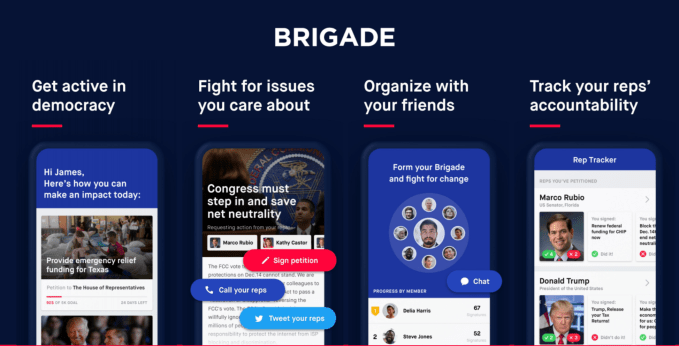
Brigade had interest from multiple potential acqhirers and allowed the engineering team’s leadership to decide to go with Pinterest. Several of Brigade’s engineers and its former VP of Engineering Trish Gray already list on LinkedIn that they’ve moved to Pinterest in the past few months. “We had a bunch of employees that took a risk on a very ambitious plan to improve our democracy and we didn’t want to leave them out to dry” Mahan stresses. “We spent more time and more money and more effort in taking care of employees over the last few months than most companies do and I think that’s a testament to Sean and his values.”
Mahan is currently in talks with several potential hosts for the next phase of Brigade, and hopes to have a transition plan in place in the next month. “We’ve in parallel been exploring where we take the technology and the user base next. We want to be sure that it lives on and can further the mission the we set out to achieve even if it doesn’t look like the way it does today.” Though the company’s output is tough to measure, Mahan tells me that “Brigade built a lot of foundational technology such as high quality voter matching algorithms and an entire model for districting people to their elected representatives. My hope for our legacy is that we were able to solve some of these problems that other people can build on.” Given Parker’s previous work with Marijuana legalization campaign Prop 64 in California and his new Opportunity Zones tax break effort, Brigade’s end won’t be Parker’s exit from politics.
Brigade’s breakup could still cast an ominous shadow over the govtech ecosystem, though. Alongside recent layoffs at grassroots campaign text message tool Hustle, it’s proven difficult for some startups in politics to become sustainable businesses. Exceptions like Palantir succeed by arming governments with data science that can be weaponized against citizens. Yet with the 2020 elections around the corner, fake news and election propaganda still a threat, and technology being applied for new nefarious political purposes, society could benefit from more tools built to amplify social justice and a fair democratic process.
Powered by WPeMatico
Did anyone else listen to season one of StartUp, Alex Blumberg’s OG Gimlet podcast? I did, and I felt like a proud mom this week reading stories of the major, first-of-its-kind Spotify acquisition of his podcast production company, Gimlet. Spotify also bought Anchor, a podcast monetization platform, signaling a new era for the podcasting industry.
On top of that, Himalaya, a free podcast app I’d never heard of until this week, raised a whopping $100 million in venture capital funding to “establish itself as a new force in the podcast distribution space,” per Variety.
The podcasting business definitely took center stage, but Lime and Bird made headlines, as usual, a new unicorn emerged in the mental health space and Instacart, it turns out, has been screwing its independent contractors.
As mentioned, Spotify, or shall we say Spodify, gobbled up Gimlet and Anchor. More on that here and a full analysis of the deal here. Key takeaway: it’s the dawn of podcasting; expect a whole lot more venture investment and M&A activity in the next few years.
This week’s biggest “yikes” moment was when reports emerged that Instacart was offsetting its wages with tips from customers. An independent contractor has filed a class-action lawsuit against the food delivery business, claiming it “intentionally and maliciously misappropriated gratuities in order to pay plaintiff’s wages even though Instacart maintained that 100 percent of customer tips went directly to shoppers.” TechCrunch’s Megan Rose Dickey has the full story here, as well as Instacart CEO’s apology here.
Slack confidentially filed to go public this week, its first public step toward either an IPO or a direct listing. If it chooses the latter, like Spotify did in 2018, it won’t issue any new shares. Instead, it will sell existing shares held by insiders, employees and investors, a move that will allow it to bypass a roadshow and some of Wall Street’s exorbitant IPO fees. Postmates confidentially filed, too. The 8-year-old company has tapped JPMorgan Chase and Bank of America to lead its upcoming float.

Reddit CEO Steve Huffman delivers remarks on “Redesigning Reddit” during the third day of Web Summit in Altice Arena on November 08, 2017 in Lisbon, Portugal. (Horacio Villalobos-Corbis/Contributor)
It was particularly tough to decide which deal was the most notable this week… But the winner is Reddit, the online platform for chit-chatting about niche topics — r/ProgMetal if you’re Crunchbase editor Alex Wilhelm . The company is raising up to $300 million at a $3 billion valuation, according to TechCrunch’s Josh Constine. Reddit has been around since 2005 and has raised a total of $250 million in equity funding. The forthcoming Series D round is said to be led by Chinese tech giant Tencent at a $2.7 billion pre-money valuation.
Runner up for deal of the week is Calm, the app that helps users reduce anxiety, sleep better and feel happier. The startup brought in an $88 million Series B at a $1 billion valuation. With 40 million downloads worldwide and more than one million paying subscribers, the company says it quadrupled revenue in 2018 from $20 million to $80 million and is now profitable — not a word you hear every day in Silicon Valley.
Here’s your weekly reminder to send me tips, suggestions and more to kate.clark@techcrunch.com or @KateClarkTweets.
I listened to the Bird CEO’s chat with Upfront Ventures’ Mark Suster last week and wrote down some key takeaways, including the challenges of seasonality and safety in the scooter business. I also wrote about an investigation by Consumer Reports that found electric scooters to be the cause of more than 1,500 accidents in the U.S. I’m also required to mention that e-scooter unicorn Lime finally closed its highly anticipated round at a $2.4 billion valuation. The news came just a few days after the company beefed up its executive team with a CTO and CMO hire.
Databricks raises $250M at a $2.75B valuation for its analytics platform
Retail technology platform Relex raises $200M from TCV
Raisin raises $114M for its pan-European marketplace for savings and investment products
Self-driving truck startup Ike raises $52M
Signal Sciences secures $35M to protect web apps
Ritual raises $25M for its subscription-based women’s daily vitamin
Little Spoon gets $7M for its organic baby food delivery service
By Humankind picks up $4M to rid your morning routine of single-use plastic

We don’t spend a ton of time talking about the growing, venture-funded, tech-enabled logistics sector, but one startup in the space garnered significant attention this week. Turvo poached three key Uber Freight employees, including two of the unit’s co-founders. What’s that mean for Uber Freight? Well, probably not a ton… Based on my conversation with Turvo’s newest employees, Uber Freight is a rocket ship waiting to take off.
Who knew that investing in female-focused brands could turn a profit for investors? Just kidding, I knew that and this week I have even more proof! This is L., a direct-to-consumer, subscription-based retailer of pads, tampons and condoms made with organic materials sold to P&G for $100 million. The company, founded by Talia Frenkel, launched out of Y Combinator in August 2015. According to PitchBook, it was backed by Halogen Ventures, 500 Startups, Fusion Fund and a few others.
Speaking of ladies getting stuff done, Bessemer Venture Partners promoted Talia Goldberg to partner this week, making the 28-year-old one of the youngest investing partners at the Silicon Valley venture fund. Plus, Palo Alto’s Eclipse Ventures, hot off the heels of a $500 million fundraise, added two general partners: former Flex CEO Mike McNamara and former Global Foundries CEO Sanjay Jha.
If you enjoy this newsletter, be sure to check out TechCrunch’s venture-focused podcast, Equity. In this week’s episode, available here, Crunchbase editor-in-chief Alex Wilhelm and I chat about the expanding podcast industry, Reddit’s big round and scooter accidents.
Want more TechCrunch newsletters? Sign up here.
Powered by WPeMatico
If you’ve ever seen a lamp or chair that you liked and wished you could just take a picture and find it online, well, GrokStyle let you do that — and now the company has been snatched up by Facebook to augment its own growing computer vision department.
GrokStyle started as a paper — as AI companies often do these days — at 2015’s SIGGRAPH. A National Science Foundation grant got the ball rolling on the actual company, and in 2017 founders Kavita Bala and Sean Bell raised $2 million to grow it.
The basic idea is simple: matching a piece of furniture (or a light fixture, or any of a variety of product types) in an image to visually similar ones in stock at stores. Of course, sometimes the simplest ideas are the most difficult to execute. But Bala and Bell made it work, and it was impressive enough in action that Ikea on first sight demanded it be in the next release of its app. I saw it in action and it’s pretty impressive.
Facebook’s acquisition of the company (no terms disclosed) makes sense on a couple of fronts: First, the company is investing heavily in computer vision and AI, so GrokStyle and its founders are naturally potential targets. Second, Facebook is also trying to invest in its marketplace, and using the camera as an interface for it fits right into the company’s philosophy.
One can imagine how useful it would be to be able to pull up the Facebook camera app, point it at a lamp you like at a hotel and see who’s selling it or something like it on the site.
Facebook did not answer my questions regarding how GrokStyle’s tech and team would be used, but offered the following statement: “We are excited to welcome GrokStyle to Facebook. Their team and technology will contribute to our AI capabilities.” Well!
There’s an “exciting journey” message on GrokStyle’s webpage, so the old site and service is gone for good. But one assumes that it will reappear in some form in the future. I’ve asked the founders for comment and will update the post if I hear back.
Powered by WPeMatico
Carbonite, the online backup and recovery company based in Boston, announced late yesterday that it will be acquiring Webroot, an endpoint security vendor, for $618.5 million in cash.
The company believes that by combining its cloud backup service with Webroot’s endpoint security tools, it will give customers a more complete solution. Webroot’s history actually predates the cloud, having launched in 1997. The private company reported $250 million in revenue for fiscal 2018, according to data provided by Carbonite . That will combine with Carbonite’s $296.4 million in revenue for the same time period.
Carbonite CEO and president Mohamad Ali saw the deal as a way to expand the Carbonite offering. “With threats like ransomware evolving daily, our customers and partners are increasingly seeking a more comprehensive solution that is both powerful and easy to use. Backup and recovery, combined with endpoint security and threat intelligence, is a differentiated solution that provides one, comprehensive data protection platform,” Ali explained in a statement.
The deal not only enhances Carbonite’s backup offering, it gives the company access to a new set of customers. While Carbonite sells mainly through Value Added Resellers (VARs), Webroot’s customers are mainly 14,000 Managed Service Providers (MSPs). That lack of overlap could increase its market reach through to the MSP channel. Webroot has 300,000 customers, according to Carbonite.
This is not the first Carbonite acquisition. It has acquired several other companies over the last several years, including buying Mozy from Dell a year ago for $145 million. The acquisition strategy is about using its checkbook to expand the capabilities of the platform to offer a more comprehensive set of tools beyond core backup and recovery.
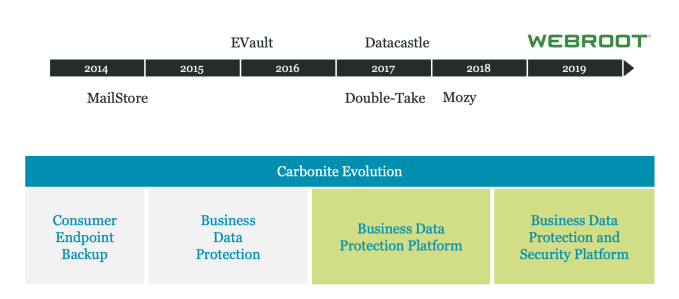
Graphic: Carbonite
The company announced it is using cash on hand and a $550 million loan from Barclays, Citizens Bank and RBC Capital Markets to finance the deal. Per usual, the acquisition will be subject to regulatory approval, but is expected to close this quarter.
Powered by WPeMatico
Dixa, a Copenhagen-based startup that offers a platform to help companies provide better and more consistent customer service across multiple channels, has raised $14 million in Series A funding. The round is led by Project A Ventures, with participation from early investor SEED Capital.
Founded in 2015 by Jacob Vous Petersen and Mads Fosselius, Dixa is on mission to end bad customer service with the help of smarter technology to facilitate more personalised customer support. Dubbed a “customer friendship” platform, the cloud-based software works across multiple channels — including phone, chat, e-mail and Facebook Messenger — and employs a smart routing system so the right support requests reach the right people within an organisation.
“The problem for customer-facing support teams today is that tickets shared in boxes and legacy call center solutions limit a brand’s ability to connect to their customers where they want to and add extra administrative burdens that ultimately harms the customer experience,” co-founder and CEO Mads Fosselius tells me.
“Despite companies and brands promising stellar customer experiences and service, [with] digital transformation and technology vendors promising even more, the facts are that 75 percent of all customers have had a bad customer experience within the past six months and 70 percent say they will leave a brand after just one bad experience,” he says, citing Salesforce’s recent ‘State of the Connected Customer’ 2018 report.
Dixa’s solution is described by Fosselius as a “next-gen” customer engagement platform built for personal and insightful conversations across all channels. To various degrees, it competes with Zendesk, Freshdesk, Salesforce Servicecloud and Avaya, Cisco and 8×8. “Dixa is different as it’s a one channel-neutral platform and it works [how[ friends connect and communicate, but for engagement between brands and their customers. We call it a ‘Customer Friendship’ platform,” says Fosselius.
This sees Dixa help companies ensure that customers can always get the help they need when they need it and on the channel they prefer. The software’s algorithms smartly re-route requests to the correct human or bot based on a raft of data. This includes past conversations, orders, reviews and sentiment. Additionally, the context is taken into account, such as the communication channel used, web page visited, device, etc., and the skills plus availability of the relevant customer-facing employee.
The result, says Dixa, is a system that makes it possible to deliver a consistent level of personal service, regardless of how the customer reaches out.
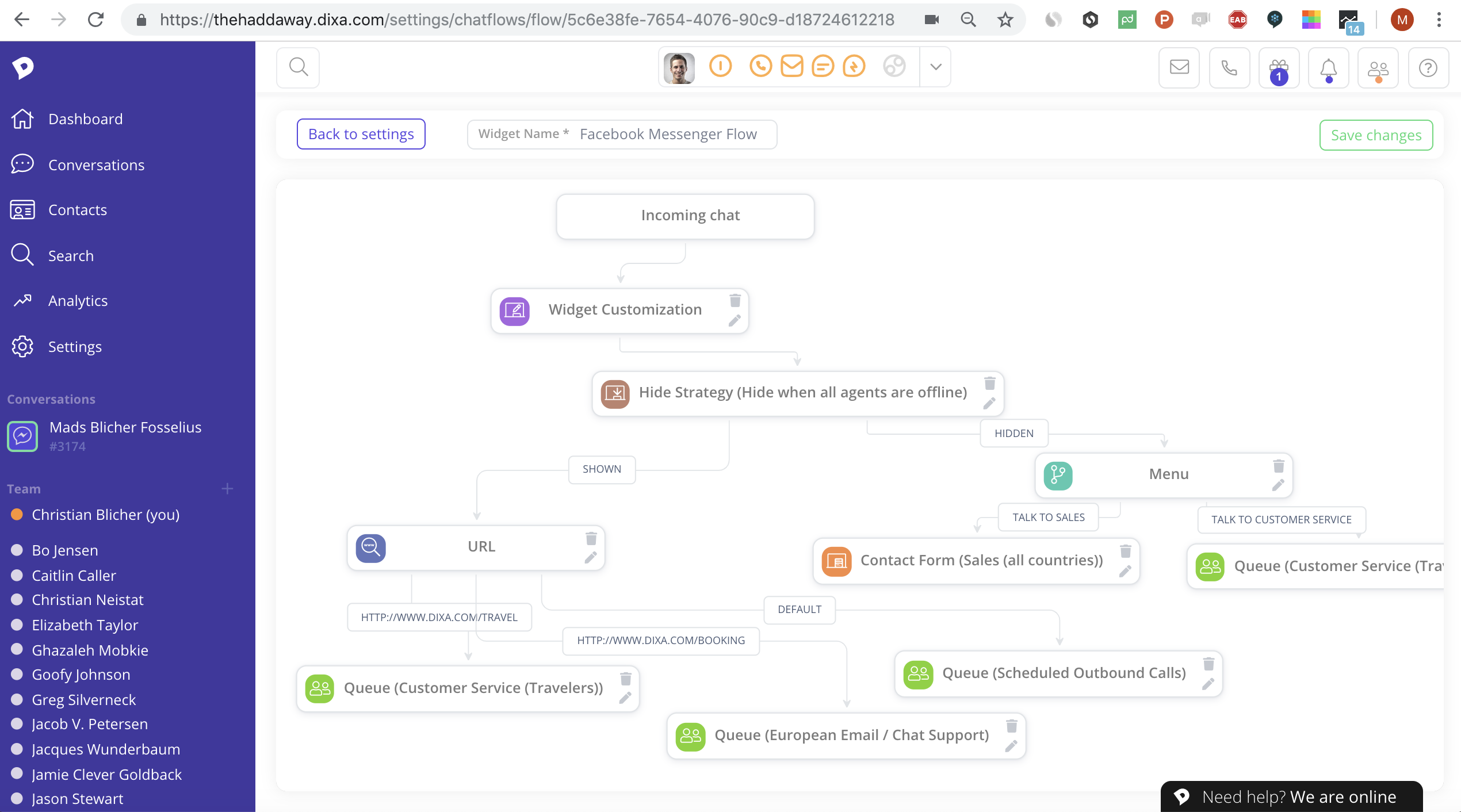
To that end, the Dixa platform is targeting “customer-centric” brands with 5-500 customer-facing agents, such as scale-ups and companies in the travel, e-commerce, fintech and transport/delivery sectors. Its current customer base spans 23 countries and includes brands like Bosch, Interflora,Trustpilot, Danish design icon Hay and food waste movement company Too Good to Go.
Adds Fosselius: “We don’t believe in tickets and siloed ‘silver bullet’ customer support solutions doing one thing or one channel very well, the world of customer support is moving towards conversational customer engagement or ‘customer friendship’ as we like to call it, where the strong bond and relation between brands and customers are the center piece.”
Powered by WPeMatico
Earlier this week, Slack announced that it has filed the paperwork to go public at some point later this year. The big question is, will the company exit into the public markets as expected, or will one of the technology giants swoop in at the last minute with buckets of cash and take them off the market?
Slack, which raised more than $1 billion on an other-worldly $7 billion valuation, is an interesting property. It has managed to grow and be successful while competing with some of the world’s largest tech companies — Microsoft, Cisco, Facebook, Google and Salesforce. Not coincidentally, these deep-pocketed companies could be the ones that come knock, knock, knocking at Slack’s door.
Slack has managed to hold its own against these giants by doing something in this space that hadn’t been done effectively before. It made it easy to plug in other services, effectively making Slack a work hub where you could spend your day because your work could get pushed to you there from other enterprise apps.
As I’ve discussed before, this centralized hub has been a dream of communications tools for most of the 21st century. It began with enterprise IM tools in the early 2000s, and progressed to Enterprise 2.0 tools in the 2007 time frame. That period culminated in 2012 when Microsoft bought Yammer for $1.2 billion, the only billion-dollar exit for that generation of tools.
I remember hearing complaints about Enterprise 2.0 tools. While they had utility, in many ways they were just one more thing employees had to check for information beyond email. The talk was these tools would replace email, but a decade later email’s still standing and that generation of tools has been absorbed.
In 2013, Slack came along, perhaps sensing that Enterprise 2.0 never really got mobile and the cloud, and it recreated the notion in a more modern guise. By taking all of that a step further and making the tool a kind of workplace hub, it has been tremendously successful, growing to 8 million daily users in roughly 4 years, around 3 million of which were the paying variety, at last count.
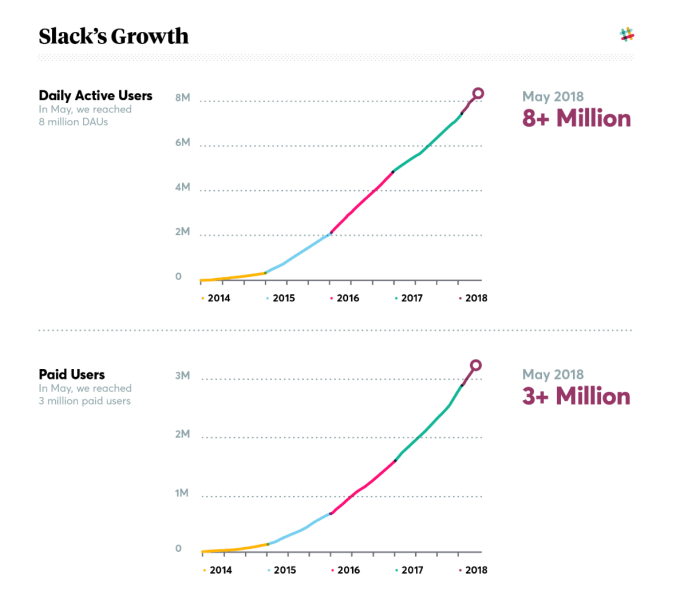
Slack’s growth numbers as of May 2018
All of this leads us back to the exit question. While the company has obviously filed for IPO paperwork, it might not be the way it ultimately exits. Just the other day CNBC’s Jay Yarrow posited this questions on Twitter:
Is there any reason for Microsoft not to buy Slack for $20 billion? Seems like a perfect fit and at $20 billion could be a bargain.
— Jay Yarow (@jyarow) February 6, 2019
Not sure where he pulled that number from, but if you figure 3x valuation, that could be the value for a company of this ilk. There would be symmetry in Microsoft buying Slack six years after it plucked Yammer off the market, and it would remove a major competitive piece from the board, while allowing Microsoft access to Slack’s growing customer base.
Nobody can see into the future, and maybe Slack does IPO and takes its turn as a public company, but it surely wouldn’t be a surprise if someone came along with an offer it couldn’t refuse, whatever that figure might be.
Powered by WPeMatico
Tink, the European open banking platform headquartered in Sweden, has deposited €56 million in new funding. Leading the round is U.S.-based Insight Venture Partners. Existing backers Sunstone, SEB, Nordea Ventures and ABN AMRO Digital Impact Fund also participated.
A number of other investors have been added to Tink’s cap table, too. They include Christian Clausen, former Chairman of the European Banking Federation, and — most notably — Nikolay Storonsky, co-founder of banking app and fintech ‘unicorn’ Revolut. According to sources, the new round of funding gives Tink a post-money valuation of €240 million.
Originally launched in Sweden in 2013 as a consumer-facing finance app with bank account aggregation at its heart, Tink has since repositioned its offering to provide the same underlying technology and more to banks and other financial service providers who want to ride the open banking/PSD2 train.
Through various APIs, Tink provides four pillars of technology: “Account Aggregation,” “Payment Initiation,” “Personal Finance Management” and “Data Enrichment”. These can be used by third parties to roll their own standalone apps or integrated into existing banking applications.
To that end, Tink says its developer platform is launching in five new markets, significantly boosting the fintech’s European coverage. They are U.K., Austria, Germany, Belgium and Spain, adding to the company’s Nordics base and bringing the total number of markets to nine countries.
Armed with new capital, Tink says the plan is to get to 20 markets by the end of 2019, targeting a range of customers “from big banks to individual developers”. In other words, the aim is to become a truly pan-European open banking platform. To help with this, headcount will increase significantly.
As it stands, Tink employs 150 people at its Stockholm headquarters, and recently opened an office in London. It plans to establish four more offices this year, doubling its European team to around 300. Customers include SEB, ABN AMRO, BNP Paribas Fortis, Nordea and Klarna.
Cue statement from Daniel Kjellén, co-founder and CEO, of Tink: “This funding round allows us to accelerate our European roll-out but also invest further in our data services. As Europe gradually embraces open banking, our platform has proved to be its rails and brains – delivering the technology that makes it possible. We attribute our success to being the first platform provider to combine account aggregation and payment initiation, the scale of our connectivity and our smart data products that make it all understandable”.
That’s not to say that Tink isn’t without competition, even if open banking/PSD2 feels like a bronze stroll rather than a gold rush so far, although things are definitely starting to heat up. Other fintechs in the space with overlapping products include Bud (which is backed by a host of banks, including HSBC), Meniga, and upstart TrueLayer.
Powered by WPeMatico
Calm, the meditation and wellness app that launched back in 2012, has today announced the close of an $88 million Series B financing with a valuation of $1 billion. (We have not been able to clarify whether the valuation was post- or pre-money.)
The funding was led by TPG Growth, with participation from CAA and existing investors Insight Venture Partners and Sound Ventures.
As meditation grows in popularity across the U.S. — the CDC says it tripled from 4.1 percent in 2012 to 14.2 percent in 2017 — Calm has capitalized on the craze by offering a suite of mindfulness and wellness tools, from guided meditation sessions to a product called “Sleep Stories,” via a subscription.
But Calm is also meeting stress where it lives. For example, the company invested $3 million in XPresSpa late in 2018. XPresSpa is a chain of quick spa stores found in airports. Meanwhile, Calm partnered with American Airlines to offer Calm content within AA’s in-flight entertainment system.
The growth of Calm is hard to deny. The company says that it has topped 40 million downloads worldwide, with more than one million paying subscribers. Calm also says that it quadrupled its revenue in 2018 — the company is now profitable — and is on track to do $150 million in annual revenue.
With the new financing, Calm’s total amount raised comes to $116 million.
Moreover, Calm’s valuation has soared from $250 million at the beginning of 2018, on the heels of a $27 million Series A, to now hit $1 billion.
Here’s what co-founder and co-CEO Michael Acton Smith had to say in a prepared statement:
We started as a meditation app, but have grown far beyond that. Our vision is to build one of the most valuable and meaningful brands of the 21st century. Health and wellness is a $4 trillion industry and we believe there is a big opportunity to build the leading company in this fast growing and important space.
Co-founder and co-CEO Alex Tew said that the funding will predominantly go toward international growth and increased investment in content.
Powered by WPeMatico
Reddit is raising $150 million to $300 million to keep the front page of the internet running, multiple sources tell TechCrunch. The forthcoming Series D round is said to be led by Chinese tech giant Tencent at a $2.7 billion pre-money valuation. Depending on how much follow-on cash Reddit drums up from Silicon Valley investors and beyond, its post-money valuation could reach an epic $3 billion.
As more people seek esoteric community and off-kilter entertainment online, Reddit continues to grow its link-sharing forums. Indeed, 330 million monthly active users now frequent its 150,000 Subreddits. That warrants the boost to its valuation, which previously reached $1.8 billion when it raised $200 million in July 2017. As of then, Reddit’s majority stake was still held by publisher Conde Nast, which bought in back in 2006 just a year after the site launched. Reddit had raised $250 million previously, so the new round will push it to $400 million to $550 million in total funding.
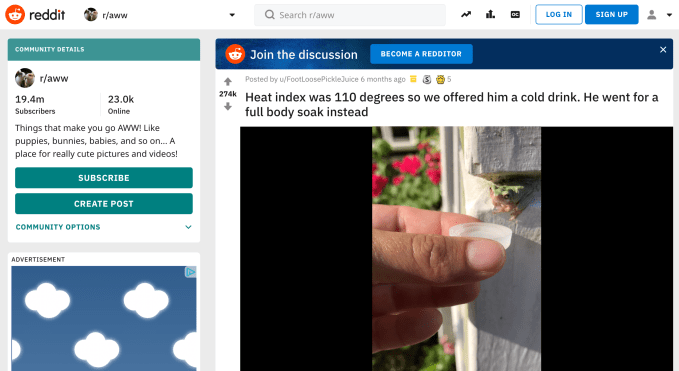
It should have been clear that Reddit was on the prowl after a month of pitching its growth to the press and beating its own drum. In December Reddit announced it had reached 1.4 billion video views per month, up a staggering 40 percent from just two months earlier after first launching a native video player in August 2017. And it made a big deal out of starting to sell cost-per-click ads in addition to promoted posts, cost per impression and video ads. A 22 percent increase in engagement and 30 percent rise in total view in 2018 pushed it past $100 million in revenue for the year, CNBC reported.
The exact details of the Series D could fluctuate before it’s formally announced, and Reddit and Tencent declined to comment. But supporting and moderating all that content isn’t cheap. The company had 350 employees just under a year ago, and is headquartered in pricey San Francisco — though in one of its cheaper but troubled neighborhoods. Until Reddit’s newer ad products rev up, it’s still relying on venture capital.
Tencent’s money will give Reddit time to hit its stride. It’s said to be kicking in the first $150 million of the round. The Chinese conglomerate owns all-in-one messaging app WeChat and is the biggest gaming company in the world thanks to ownership of League of Legends and stakes in Clash of Clans-maker Supercell and Fortnite developer Epic. But China’s crackdown on gaming addiction has been rough for Tencent’s valuation and Chinese competitor ByteDance’s news reader app Toutiao has grown enormous. Both of those facts make investing in American newsboard Reddit a savvy diversification, even if Reddit isn’t accessible in China.
Reddit could seek to fill out its round with up to $150 million in additional cash from previous investors like Sequoia, Andreessen Horowitz, Y Combinator or YC’s president Sam Altman. They could see potential in one of the web’s most unique and internet-native content communities. Reddit is where the real world is hashed out and laughed about by a tech-savvy audience that often produces memes that cross over into mainstream culture. And with all those amateur curators toiling away for internet points, casual users are flocking in for an edgier look at what will be the center of attention tomorrow.

Reddit has recently avoided much of the backlash hitting fellow social site Facebook, despite having to remove 1,000 Russian trolls pushing political propaganda. But in the past, the anonymous site has had plenty of problems with racist, misogynistic and homophobic content. In 2015 it finally implemented quarantines and shut down some of the most offensive Subreddits. But harassment by users contributed to the departure of CEO Ellen Pao, who was replaced by Steve Huffman, Reddit’s co-founder. Huffman went on to abuse that power, secretly editing some user comments on Reddit to frame them for insulting the heads of their own Subreddits. He escaped the debacle with a slap on the wrist and an apology, claiming “I spent my formative years as a young troll on the Internet.”
Investors will have to hope Huffman has the composure to lead Reddit as it inevitably encounters more scrutiny as its valuation scales up. Its policy choice about what constitutes hate speech and harassment, its own company culture and its influence on public opinion will all come under the microscope. Reddit has the potential to give a voice to great ideas at a time when flashy visuals rule the web. And as local journalism wanes, the site’s breed of vigilante web sleuths could be more in demand, for better or worse. But that all hinges on Reddit defining clear, consistent, empathetic policy that will help it surf atop the sewage swirling around the internet.
Powered by WPeMatico
Slack, the provider of workplace communication and collaboration tools, has submitted paperwork with the Securities and Exchange Commission to go public later this year, the company announced on Monday.
This is its first concrete step toward becoming a publicly listed company, five years after it launched.
Headquartered in San Francisco, Slack has raised more than $1 billion in venture capital investment, including a $427 million funding round in August. The round valued the business at $7.1 billion, cementing its position as one of the most valuable privately held businesses in the U.S.
The company counted 10 million daily active users around the world and 85,000 paying users as of January 2019. According to data provided (via email) by SensorTower, Slack’s new users on mobile increased roughly 21 percent last quarter compared to Q4 2017, while total installs on mobile grew 24 million. The company recorded 8 million installs in 2018, up 21 percent year-over-year.
Slack’s investors include SoftBank’s Vision Fund, Dragoneer Investment Group, General Atlantic, T. Rowe Price Associates, Wellington Management, Baillie Gifford, Social Capital and IVP, as well as early investors Accel and Andreessen Horowitz.
Slack is one of several tech unicorns on deck to go public this year. Uber and Lyft have both similarly filed confidentially to go public in what are expected to be traditional initial public offerings. Slack, however, is expected to pursue a direct listing, following in Spotify’s footsteps. Instead of issuing new shares, Slack will sell directly to the market existing shares held by insiders, employees and investors, a move that will allow it to bypass a roadshow and some of Wall Street’s exorbitant IPO fees.
Powered by WPeMatico